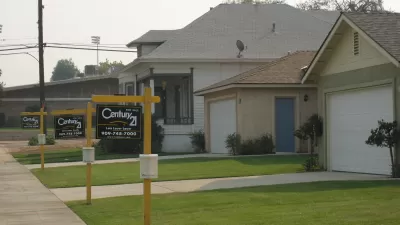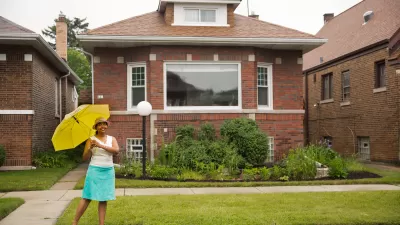Programs that help households of color buy homes haven't made much of a dent in the racial wealth gap. But some strategies could generate better outcomes for buyers.

Homeownership remains one of the most common tools employed to try to help Black families build intergenerational wealth. However, for reasons authors in this series have detailed, simply achieving the dream of buying a house often does not generate the results that it generates for white families. Households of color tend to own homes of lower value and have a higher percent of their assets in home equity, feeding into the disproportionately low share of wealth held by Black and Latinx households.
Housing advocates say that without significant policy and practice changes, both the racial homeownership gap and the racial wealth gap will remain wide for decades to come.
Race-Conscious Programs
One step is to actually target specific groups for support, rather than assuming that programs targeting low-income homebuyers will be sufficient. "When you are a policymaker, you are thinking about things that are good for all … but we didn’t get here because of policies that were good for all," stated Chrystal Kornegay, executive director of MassHousing, during a webcast in December 2021 hosted by the Urban Institute. MassHousing is an independent, quasi-public agency that lends over a billion dollars annually to produce and preserve affordable rental housing and to create homeownership opportunities for low- and moderate-income borrowers.
"You can’t have a race-conscious solution that doesn’t actually include race in it," she added.
Although programs to help people of color get into homes have been around for decades, Laurie Benner, associate vice president of programs at the National Fair Housing Alliance, says the racial homeownership gap is still prevalent because "none of the programs have been racially explicit."
There’s an idea out there that "because of fair housing laws . . . you can’t say 'This program is for this category of people,'" Benner adds, "but in fact, lenders can do it. They can create a loan program just for Black people, or Latino people, or for AAPIs, Indigenous people, and so on."
Through the Equal Credit Opportunity Act, financial institutions are permitted to develop special purpose credit programs (SPCPs) to meet special social needs and benefit disadvantaged groups. When properly designed, SPCPs can play a crucial role in promoting equity and inclusion, building wealth, and removing barriers that have contributed to housing instability and residential segregation.
So the resistance isn’t legal, it’s optics—a throwback to colorblind ideals. "We’ve seen lending programs for people with disabilities, and no one is outraged by that," explains Benner, "but if a lender were to introduce a mortgage program specifically for Black or Latino people, it would almost certainly be subject to legal challenge."
Benner adds that some banks have ...
FULL STORY: Making Homeownership Work Better

Trump Administration Could Effectively End Housing Voucher Program
Federal officials are eyeing major cuts to the Section 8 program that helps millions of low-income households pay rent.

Planetizen Federal Action Tracker
A weekly monitor of how Trump’s orders and actions are impacting planners and planning in America.

Ken Jennings Launches Transit Web Series
The Jeopardy champ wants you to ride public transit.

‘Minnesota Nice’ Isn’t so Nice When You Can’t Find a Place to Live
The Economic Development and Housing Challenge Program can help address the scourge of homelessness among Indigenous people.

NYC Open Streets Organizers Call for City Support
The number of open streets projects has dropped year after year as volunteer groups struggle to fund and staff them.

Crime Continues to Drop on Philly, San Francisco Transit Systems
SEPTA and BART both saw significant declines in violent crime in the first quarter of 2025.
Urban Design for Planners 1: Software Tools
This six-course series explores essential urban design concepts using open source software and equips planners with the tools they need to participate fully in the urban design process.
Planning for Universal Design
Learn the tools for implementing Universal Design in planning regulations.
Heyer Gruel & Associates PA
Ada County Highway District
Institute for Housing and Urban Development Studies (IHS)
City of Grandview
Harvard GSD Executive Education
Toledo-Lucas County Plan Commissions
Salt Lake City
NYU Wagner Graduate School of Public Service





























